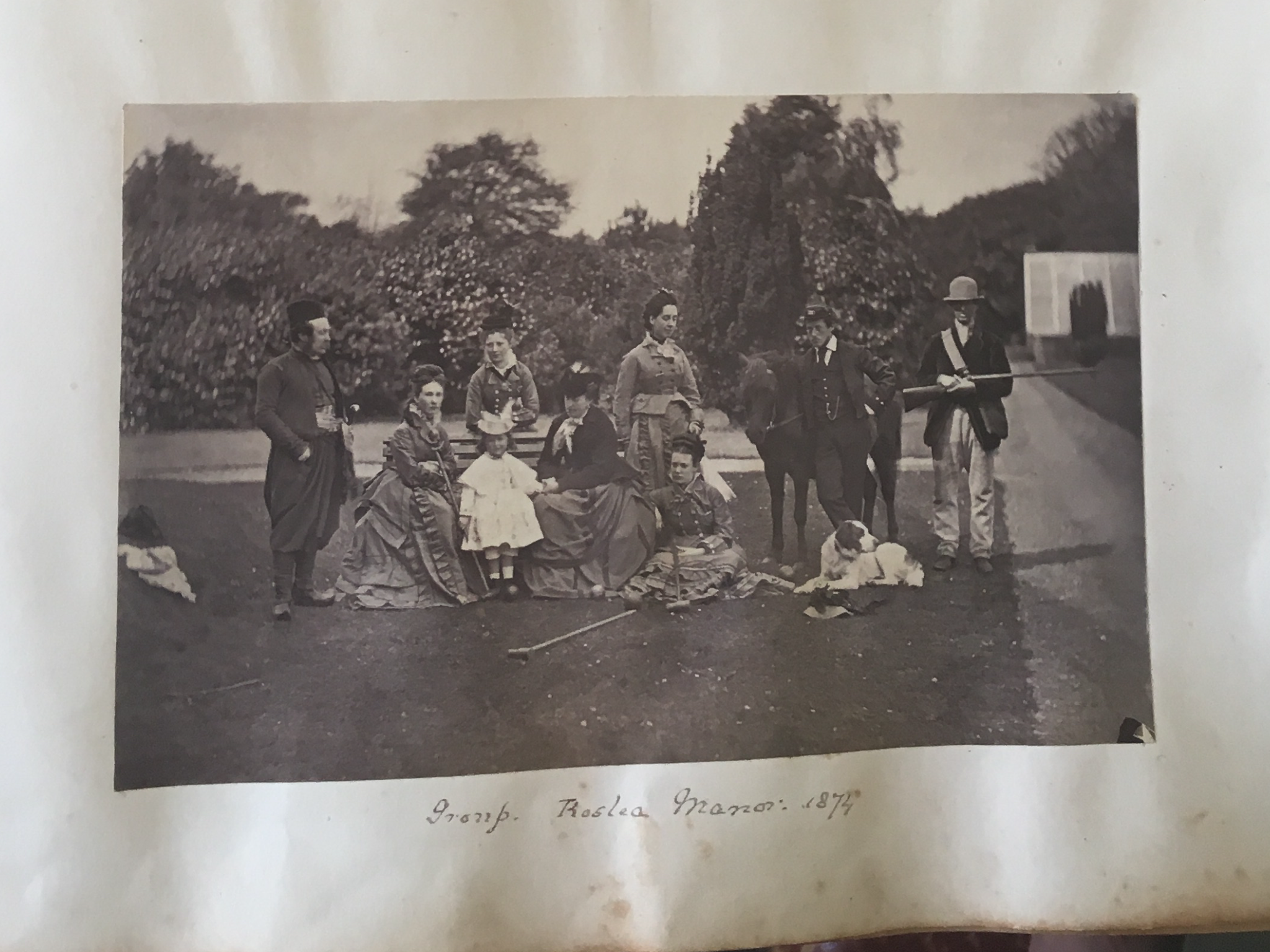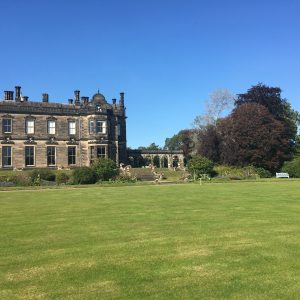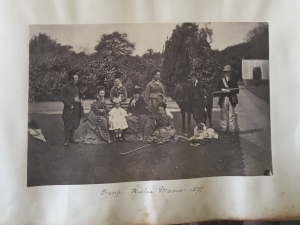
September 28, 2020, by eburke
Clara Madden of Rosslea Manor, County Fermanagh
Clara Madden (1856-1917) was the daughter of John and Clara Madden of Rosslea Manor in County Fermanagh, a branch of the Madden family of Hilton Park and lessors of the Slatmulrooney estate of Trinity College Dublin. It is more difficult to come across political commentary written by women in late 19th and early 20th century Ireland; most of the historical archives are self-evidently of ‘great men’ or their associates. It was a pleasure then to discover the diary of Clara Madden in the Earl of Harrowby Manuscript Collection at Sandon Hall in rural Staffordshire. The diary’s primary purpose is not as a political journal, but its author does occasionally throw light on her perspective of political events. Clara writes in French in her younger years. These passages are full of hope and passion. Rejected by a local member of the gentry, to whom she had hoped to be engaged, and detached from her stepmother, she later switches to more laconic prose in English.

Sandon Hall, Staffordshire
Through Clara’s eyes we get a sense of a family (and an elite) struggling to respond to personal setbacks, the pressures of agrarian protest and the Home Rule movement. In 1875 Walter Wilmot Madden, Clara’s eldest brother, was thrown out of the Royal Navy for “deception” – he cheated in an exam to become a lieutenant. He departed for New Zealand, where he later worked as a teacher. Another brother, John Beresford Madden, a former officer in the Monaghan Militia, was paralysed in a horse-riding accident in New Zealand. He returned to Ireland to live with his sisters, dying in 1928.
The Land League and Lord Rossmore
The Roslea estate experienced significant unrest as a result of the National Land League agitation. The Maddens tried to face it down – in 1881 Clara wrote that,
Hussars, Rifles and extra police came [illegible] late Thursday, evicted a number of people for non-payment of rent. Great outcry. Father told me, ‘Everything concerning our future prospects, fortunes, settlement etc and the probable of our present means…’
John Madden subsequently struggled to find new tenants to replace those evicted.
There were brighter, more hopeful moments. On 16th October 1883 Clara described the Roslea counter-demonstration organised by the Earls of Rossmore and Erne in response to a mass meeting of the Home Rule MP, Tim Healy as a great victory,
Great demonstration in Roslea. Nationalists defeated. 11th Lancers, foot soldiers, and police came to keep peace. Lords Crichton and Rossmore and many leading gentry attended. We drove to the field. 5000 Orangemen collected. Many gentlemen came to lunch here.
In 1885 Rosslea Manor was destroyed in a fire. The family moved across the county boundary to Aghafin House, just outside Clones (John Madden served as Deputy Lord Lieutenant for County Monaghan and High Sheriff for Fermanagh). By 1890 the family’s fortunes had deteriorated further. At the beginning of December, Clara Madden (rather coldly) noted in her diary,
Preparing various things for Christmas evictions to begin. £7000 of arrears due to Pater and [illegible] to College.
Clara Madden’s father was a leading member of the Property Defence Association. In 1891, Clara greeted news of the death of Charles Stewart Parnell, the great nationalist leader, with delight. Perhaps the worst was over – “11 years of Landlord persecution … Now for a new political era.”

Decline and Fall
Roslea historian Oliver McCaffrey has already described in expert detail the pressures on (and dismantling of) the College estate. Even with Parnell gone, there was no respite for the Maddens. Rent strikes continued in Fermanagh, even if the Maddens’ Monaghan tenants did intermittently pay the agents. By 1899 Clara Madden wrote of the family’s isolation, “No ones comes to visit. No one goes away.”
Perhaps the stench of military failure and financial decay affected the Maddens social standing among their own class. Nonetheless, Clara and her sister Isabel Madden were tenacious women. Clara took to cycling the winding boreens of east Fermanagh and north Monaghan, visiting former tenants of the Maddens, particularly during times of illness (Interestingly her visits in the Roslea area were overwhelmingly to Protestant farmhouses, even though Catholics made up a significant majority in the area). Nevertheless, protestant fealty to the patrician classes was limited when it came to the question of land. Clara observed that an equal number of protestants in the early 1880s did not pay their rents to the College estate.
Clara became ill and died just before the Anglo-Irish War of 1919-1921. Aghafin House was raided by the IRA in the early morning of 1 September 1920 – Isabel Madden was shot and seriously wounded but survived, dying at Aghafin in 1942 (more later). However, Clara Madden’s diary offers a useful means of tracing the networks that sustained the Anglican community in south-east Fermanagh.
The Madden Papers
Ian Beresford Madden (died 2008) placed the Madden Papers in Staffordshire, due to a distant connection between the family and the Ryder family. Ian Madden’s letters are also preserved. He was very aware of his family’s history and corresponded with many historians, including those who organised the bicentenary commemorations of the 1798 rising. In a letter to the 1798 Friends in Clones, he warned of the contemporary currency of history and hoped that the commemorations would not be used for modern day political purposes. Otherwise “… perhaps I should be seeking revenge for a Knox-line ancestor of mine who was spiked to death at Rathangan, Co Kildare, early on the 1798 troubles?” The Maddens also had long memories.
I am very grateful to the archivist, Michael Bosson, the Earl of Harrowby and his family, for granting me access to the Madden Papers.

Hello,
I would like to determine where John Ross of Kindeace from the 1700-1720 period went in Ulster when he lost his estates near Nigg in Fearn Parish, Tain. John was a grandson of the last of the Earls at Balnagowan. I believe he went to Inver Townland near Rosslea; two generations later his grandson Alexander Ross came to Canada, and is my ancestor.
Is there a particular reason why the Rosslea estate and Rosslea town are named thus, and is there any history of that area that might shed light on the Rosses who lived nearby, John, Alexander, Francis, William, Hugh and Thomas according to Griffith’s Valuation
Thanks for the comment. Rosslea or Roslea – is an anglicisation of the Irish word – ‘Ros Liath’ meaning ‘grey wood’.